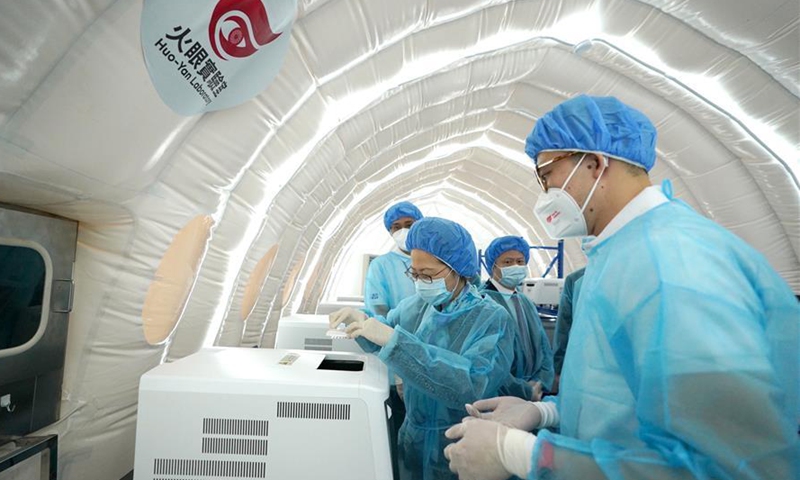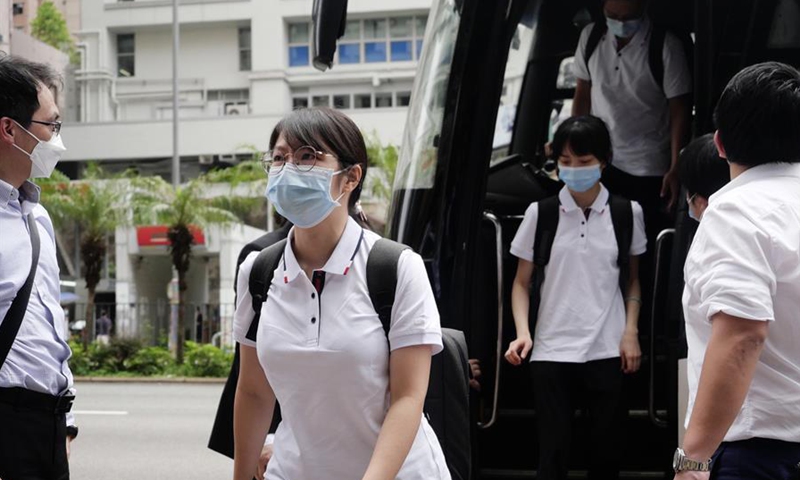Sign-up for COVID-19 tests beyond expectations in HK, defying opposition’s politicization
By Liu Caiyu and Fan Anqi Source: Global Times Published: 2020/8/31 0:38:39 Last Updated: 2020/8/31 0:26:39
HK has long road before return to normalcy

Chief Executive of the Hong Kong Special Administrative Region (HKSAR) Carrie Lam visits the Fire Eye Laboratory at Sun Yat Sen Memorial Park Sports Center in Hong Kong, south China, Aug. 28, 2020. (Xinhua/Lui Siu Wai)
Two days before Hong Kong activates a mass nucleic acid testing program on Tuesday, the city has seen at least 400,000 sign up for the free COVID-19 tests with some testing centers already fully booked, a slap in the face of some opposition forces who are trying to discourage residents to register and politicize the issue.
Since the online appointment service was open to the public on Saturday, the number of those registering for testing has risen, with at least 48 out of 141 testing centers in communities now fully booked on the first day of testing. Some are booked out for the first three days.
Upon facing defamation on the mainland's aid to help the Hong Kong Special Administrative Region (HKSAR) combat the COVID-19 epidemic from a number of troublemakers with ulterior motives, the Hong Kong and Macao Affairs Office of China's State Council, the Liaison Office of the Central Government in HKSAR and the HKSAR government issued statements on Sunday, condemning them for being vicious with no regard for the safety and health of Hong Kong residents.
The number of new cases in Hong Kong has been hovering around 10-20 per day, but more than one-third of these cases are of unknown origin and a hidden chain of transmission in the community continues to pose challenges.
Beyond expectations
The naysayers have not stopped residents from registering with the scheme as they are eager to see the city return to normality.
In the past days, Victor Chan Chi-ho, a community official from the New People's Party in Hong Kong has helped hundreds of residents to access the registration website and sign up online as some had trouble logging in.
Soon after the website was open to the public, the response has exceeded expectations as many test centers have been overwhelmed, Chan told the Global Times.
With the support of the central government, the HKSAR government has greatly boosted its testing capability and the mass testing program will start from Tuesday, September 1 and last for at least seven days. A total of 141 community testing centers have been set up in 18 districts in Hong Kong. More than 6,000 medical staff in Hong Kong are involved in the scheme.
Residents said they hoped that more people would get tested in order to find asymptomatic virus carriers as soon as possible and cut off community transmission, Chan said.
"It's better than nothing right? I'd like to know if I or my family members have contracted the virus," said Kevin Choy, who added he is freeing up his schedule so he can register for a test.
"If my parents want to go, I'll also make an appointment for them," Choy said. Choy is among the many residents in Hong Kong who are aware of the importance of the tests but he also said he wondered if the scheme will be effective as some people are not participating.
Choy told the Global Times that the testing itself has been politicized and there are a lot of conspiracy theories such as whether the medical staff had been properly trained or how will the government deal with their personal data. It is hard for a citizen not to think about the pros and cons, he said.
Some political activists claimed that the government would collect the DNA of Hong Kong residents under the guise of the testing program and that information would be sent to the mainland to establish a comprehensive scientific and technological monitoring system.
Some have expressed worries about the potential of contracting the virus at the testing spots and others have questioned the cost-efficiency of the tests, quoting local media reports on the HK$2.58 million ($330,000) that government had spent on the community testing program.
While the HKSAR government and central government have made huge efforts to arrange the citywide scheme which aims to help the city cut off community transmission, some in the opposition camp are trying to dampen the motivation of Hong Kong residents with a variety of plausible reasons.
"They are only trying to achieve their political purposes, rather than acting for the sake of public health," Chan told the Global Times on Sunday. It is absurd to see the opposition questioning the effectiveness of the mass testing program as the testing has received an unexpected welcome among Hong Kong residents, Chan said.
It is the tricks of some forces to undermine the prestige of the HKSAR government in governance, tarnish the image of the central government, discredit the socialist system with Chinese characteristics, and sow discord among the Hong Kong people towards the motherland, a spokesperson of Hong Kong and Macao Affairs Office of the State Council said.
The Liaison Office of the Central Government in HKSAR also said some people with ulterior motives who politicize the fight against COVID-19 and create and spread vicious rumors are disregarding social interests and public health.
A spokesperson for the HKSAR government expressed deep disappointment and regret at the misinformation posted online and through social media about the testing program, calling on more residents to sign up.
The HKSAR spokesperson assured the public on Sunday that the tests will be carried out in Hong Kong and samples will not be sent out of the city. Residents should not worry about the leakage of personal information as the government will delete testing results and personal data once the tests are complete.

Members of the mainland nucleic acid testing team arrive at Metropark Hotel Kowloon in Hong Kong, south China, Aug. 28, 2020. Another over 160 members of the mainland nucleic acid testing team have arrived in Hong Kong Friday for the Universal Community Testing Program (UCT Program) that starts on Sept. 1. (Xinhua/Wang Shen)
Well paid for city revitalization
Mass nucleic acid testing schemes have proven effective in many Chinese cities.
Citywide testing in Wuhan, the hardest-hit city in China in the early stages of the pandemic, helped revive its economy. In Wuhan now, people are able to gather in night clubs, dine out and walk on the streets without mandatory requirement of wearing a mask.
Hong Kong has eased some of its social distancing restrictions where restaurants and shopping malls have seen customers coming in and out and people are lining up to enter some public venues. But the international business hub has a long way to go before returning to normalcy, observers said, as people have to wear masks everywhere and always be on their guard to avoid crowds for their own safety.
As some experts in Hong Kong are questioning the effectiveness of the testing, Zeng Guang, chief epidemiologist of the Chinese Center for Disease Control and Prevention, said the scheme, which is a good effort of the HKSAR government to bring the livelihood and economy of Hong Kong back on track, will help decision-makers have a thorough understanding of the number of asymptomatic carriers within communities before adopting the next round measures to revive the city.
The advantages of mass nucleic acid testing outweigh the disadvantages, Zeng told the Global Times. Although Hong Kong is only seeing sporadic infections nowadays, the social and financial cost of controlling sporadic infections is much higher than that of the mass testing program.
There could be more asymptomatic carriers out there, Zeng said. Only by taking this crucial step of finding hidden transmission, will the Hong Kong government be able to focus on preventing a resurgence of the epidemic and revitalizing the economy, experts said.
Posted in: SOCIETY,HK/MACAO/TAIWAN